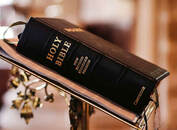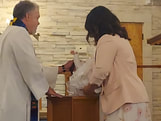What We Believe

Confessional Lutheranism
TO BE A Lutheran is to be a Christian. To be a Christian is to trust in Jesus Christ alone for salvation from sin, death and the devil. It is also to trust that the Bible is the holy, inspired, and inerrant Word of God. For Lutherans, the Holy Scriptures (the sixty-six canonical books of the Bible) are the source and norm of all teaching. Confessional Lutherans believe that God’s Word is correctly explained and taught in the Book of Concord of 1580.
The Book of Concord
The Book of Concord is a collection of documents that details what “We believe, teach, and confess” to be the true doctrine of salvation in Jesus Christ alone. These documents, known also as the Lutheran Confessions, neither replace nor add to the Bible, but rather confess (speak the same, repeat) the “faith once for all delivered to the saints” (Jude 1:3). Since the sixteenth century the Lutheran Confessions have served as the basis for unity and fellowship among Evangelical Lutheran congregations.
TO BE A Lutheran is to be a Christian. To be a Christian is to trust in Jesus Christ alone for salvation from sin, death and the devil. It is also to trust that the Bible is the holy, inspired, and inerrant Word of God. For Lutherans, the Holy Scriptures (the sixty-six canonical books of the Bible) are the source and norm of all teaching. Confessional Lutherans believe that God’s Word is correctly explained and taught in the Book of Concord of 1580.
The Book of Concord
The Book of Concord is a collection of documents that details what “We believe, teach, and confess” to be the true doctrine of salvation in Jesus Christ alone. These documents, known also as the Lutheran Confessions, neither replace nor add to the Bible, but rather confess (speak the same, repeat) the “faith once for all delivered to the saints” (Jude 1:3). Since the sixteenth century the Lutheran Confessions have served as the basis for unity and fellowship among Evangelical Lutheran congregations.
Historic Liturgy
The “historic liturgy” is the certain service structure of public worship that the Church has practiced from its earliest days. So treasured was the historic liturgy by the Lutheran reformers that they confessed in the Augsburg Confession, “the Mass [or Divine Service] is retained among us, and celebrated with the highest reverence. Nearly all the usual ceremonies are also preserved…”
The term Divine Service confesses the biblical truth that by His Word and the Sacraments of Baptism and the Lord’s Supper God serves His people gathered in worship. We take Jesus at His word in Matthew 28:20 that He is with us always, “until the end of the age.”
We believe, teach, and confess that Jesus Christ is truly present in Word and Sacrament when the Church is gathered in the name of the Father, the Son, and the Holy Spirit.
The rhythm of Lutheran worship is always from God to us. God gives; we receive. God speaks; we respond in praise. In the Divine Service God gives and speaks mightily.
Many of the words in the Divine Service come directly from the Bible, the very Word of God. Through the mouth of the Pastor we hear God pronouncing us “not guilty” because of His Son’s perfect life and sacrificial death.
In the Lord’s Supper the true body and blood of Christ are given in and with the bread and wine for the forgiveness of sins. All of these gifts are apprehended by faith and not by our own reason or strength. When we hear the Word of forgiveness in Jesus Christ, the Holy Spirit creates faith in us that we might believe salvation has come to our own person.
The “historic liturgy” is the certain service structure of public worship that the Church has practiced from its earliest days. So treasured was the historic liturgy by the Lutheran reformers that they confessed in the Augsburg Confession, “the Mass [or Divine Service] is retained among us, and celebrated with the highest reverence. Nearly all the usual ceremonies are also preserved…”
The term Divine Service confesses the biblical truth that by His Word and the Sacraments of Baptism and the Lord’s Supper God serves His people gathered in worship. We take Jesus at His word in Matthew 28:20 that He is with us always, “until the end of the age.”
We believe, teach, and confess that Jesus Christ is truly present in Word and Sacrament when the Church is gathered in the name of the Father, the Son, and the Holy Spirit.
The rhythm of Lutheran worship is always from God to us. God gives; we receive. God speaks; we respond in praise. In the Divine Service God gives and speaks mightily.
Many of the words in the Divine Service come directly from the Bible, the very Word of God. Through the mouth of the Pastor we hear God pronouncing us “not guilty” because of His Son’s perfect life and sacrificial death.
In the Lord’s Supper the true body and blood of Christ are given in and with the bread and wine for the forgiveness of sins. All of these gifts are apprehended by faith and not by our own reason or strength. When we hear the Word of forgiveness in Jesus Christ, the Holy Spirit creates faith in us that we might believe salvation has come to our own person.

Christ-Centered Church
WE BELIEVE, teach, and confess that there is one God in three persons, the Father, the Son, and the Holy Spirit. It is the Son, Jesus Christ, about whom the Scriptures speak (John 5:39).
We believe, teach, and confess that the essence of Christianity is Christ, who is true God, begotten of the Father from eternity, and true Man, born of the Virgin Mary in time. On the cross Christ redeemed mankind “not with gold or silver, but with His holy, precious blood and with His innocent suffering and death” (Small Catechism).
FaithThrough faith in Christ the heavenly gifts of forgiveness, life, and salvation are received. Through Christ’s Spirit-filled words of eternal life (John 6:63, 68) we are strengthened to do the works which He prepared in advance for us to do (Ephesians 2:10) in serving our neighbor according to our vocations.
While we strive to live our daily lives according to God’s Word, we don’t come to church to learn steps for a better life or for a “prosperity gospel” of health, wealth, and happiness. We come because God calls us to know, hear, see, feel, and taste Christ crucified, whom alone St. Paul endeavored to proclaim, and nothing else (1 Corinthians 2:2), and because we want to thank and praise Him in the company of the saints.
Congregation
The Christian life in the congregation is one lived continuously in Christ. We do not “graduate past Him.” We rest in Him as He is our Sabbath Rest (Matthew 11:28). Jesus Christ is the “one thing … necessary” (Luke 10:42) for eternal life. By receiving Christ, we receive His righteousness, life, and death.
Baptism
This is the “Good News”, the Gospel, which is the “power of God for salvation for everyone who believes” (Romans 1:16). Baptized into Christ, we stand before the Holy God of all creation and hear Him say, “You are My beloved Son, with you I am well pleased” (Mark 1:11; Luke 3:22).
We believe this because this is what Jesus Himself teaches in John 14:6 when He says, “I am the Way, and the Truth, and the Life. No one comes to the Father except through Me.”
This word Christ established as true and unchangeable at His resurrection and by revealing Himself to be alive, speaking, walking, eating, and displaying His wounds first to His closest disciples, then to more than five hundred others, then to James and then to Paul (1 Corinthians 15:5-8).
WE BELIEVE, teach, and confess that there is one God in three persons, the Father, the Son, and the Holy Spirit. It is the Son, Jesus Christ, about whom the Scriptures speak (John 5:39).
We believe, teach, and confess that the essence of Christianity is Christ, who is true God, begotten of the Father from eternity, and true Man, born of the Virgin Mary in time. On the cross Christ redeemed mankind “not with gold or silver, but with His holy, precious blood and with His innocent suffering and death” (Small Catechism).
FaithThrough faith in Christ the heavenly gifts of forgiveness, life, and salvation are received. Through Christ’s Spirit-filled words of eternal life (John 6:63, 68) we are strengthened to do the works which He prepared in advance for us to do (Ephesians 2:10) in serving our neighbor according to our vocations.
While we strive to live our daily lives according to God’s Word, we don’t come to church to learn steps for a better life or for a “prosperity gospel” of health, wealth, and happiness. We come because God calls us to know, hear, see, feel, and taste Christ crucified, whom alone St. Paul endeavored to proclaim, and nothing else (1 Corinthians 2:2), and because we want to thank and praise Him in the company of the saints.
Congregation
The Christian life in the congregation is one lived continuously in Christ. We do not “graduate past Him.” We rest in Him as He is our Sabbath Rest (Matthew 11:28). Jesus Christ is the “one thing … necessary” (Luke 10:42) for eternal life. By receiving Christ, we receive His righteousness, life, and death.
Baptism
This is the “Good News”, the Gospel, which is the “power of God for salvation for everyone who believes” (Romans 1:16). Baptized into Christ, we stand before the Holy God of all creation and hear Him say, “You are My beloved Son, with you I am well pleased” (Mark 1:11; Luke 3:22).
We believe this because this is what Jesus Himself teaches in John 14:6 when He says, “I am the Way, and the Truth, and the Life. No one comes to the Father except through Me.”
This word Christ established as true and unchangeable at His resurrection and by revealing Himself to be alive, speaking, walking, eating, and displaying His wounds first to His closest disciples, then to more than five hundred others, then to James and then to Paul (1 Corinthians 15:5-8).

